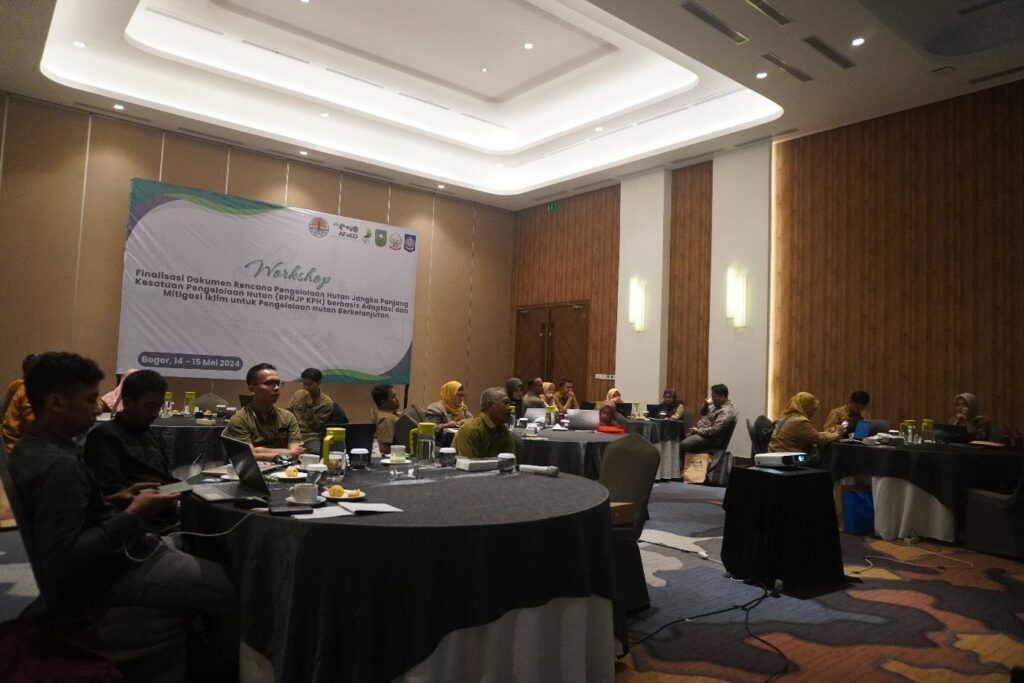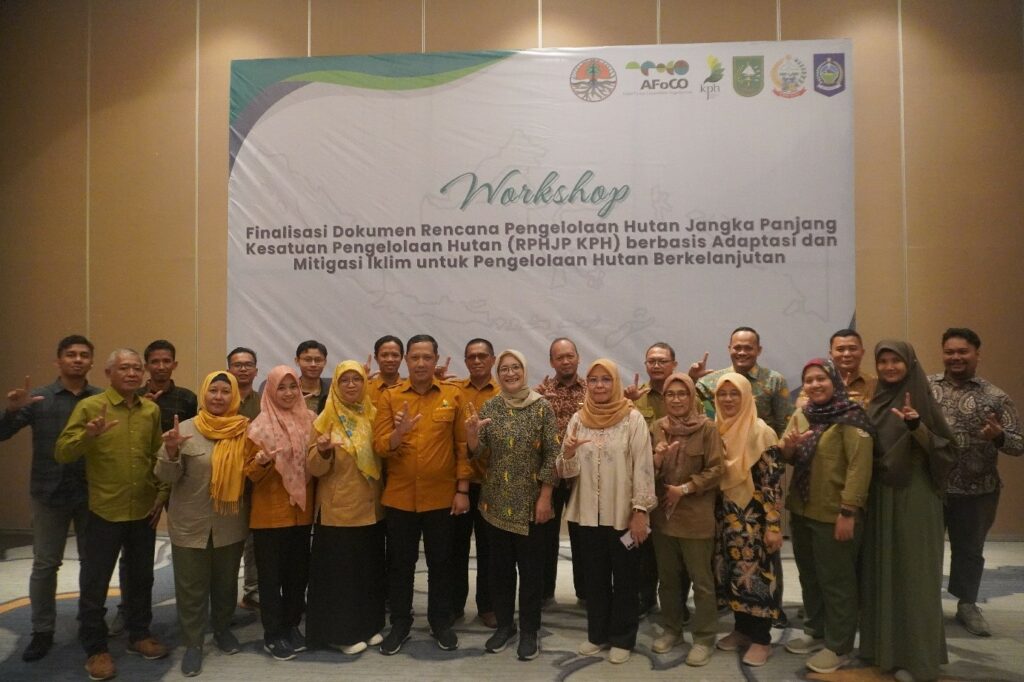Bogor, Indonesia, May 14-15, 2024 — A workshop for the development of Long-term Forest Management Plans for Forest Management Units (FMUs) was held in Bogor, Indonesia, as part of the AFoCO-Indonesia project on “Innovative Solutions for Climate Change and Biodiversity Landscape Strategy to Support SDGs in Indonesia (AFoCO/023/2021).”
FMUs, as managers of forest areas, plays a crucial role in achieving the Nationally Determined Contribution (NDC) targets. Indonesia has established the Folu Net Sink 2030 policy, aiming for the forestry and other land use sectors to reach a balanced or positive absorption level, resulting in a net reduction of 140 million tons of CO2e by 2030. This policy is supported by a provincial-level operational plan that includes 12 mitigation action plans that aim to enhance carbon sequestration and reduce emissions across Indonesia’s forestry and land sectors: Prevention of deforestation in peat and mineral areas, prevention of concession degradation, plantation forest development, natural forest enrichment, application of reduced impact logging, increasing carbon storage with and without rotation, peat water management, peat restoration, protection of high conservation value areas, and mangrove management.
To guide the implementation of these mitigation actions, the AFoCO project has assisted three (3) FMUs from Riau, South Sulawesi and West Nusa Tenggara Provinces to develop long-term forest management plans based on climate change adaptation and mitigation. These long-term plans have included specific mitigation activities in terms of the types of activities, locations, time, and costs required.
“I am very glad; it is very helpful for Ampang Plampang FMU, which is at high risk of hydrological disasters because our area is enclosed by the sea,” said Saefullah, Head of Ampang Plampang FMU, West Nusa Tenggara. At the opening of the workshop on the development of the long-term management plan, Wening Sri Wulandari, Head of the Center for Standardization of Sustainable Forest Management Instruments and the Implementing Agency of AFoCO Project 023/2021, emphasized the importance of this document. She further expressed AFoCO’s comprehensive support, from the initial processes to public consultation and sharing learning with other FMUs.
A representative from the Directorate of Climate Change Mitigation highlighted that the forestry and land sector is pivotal in achieving emission reduction targets. Under the business-as-usual scenario, this sector is expected to contribute a 17.4% reduction in emissions, which could increase to 25.4% with additional support from stakeholders. Additionally, the speakers provided information on critical land and social forestry within the FMU areas, emphasizing their importance in supporting the Long-Term Forest Management Plan and ensuring the sustainability of forest resources.


PROJECT OVERVIEW
Innovative Solutions for Climate Change and Biodiversity Landscape Strategy to Support SDGs in Indonesia
Project Duration & Budget: July 2021 – December 2024 / US$ 800,000
Implementing Agency: Center for Standardization of Sustainable Forest Management Instruments / Pusat Standardisasi Instrumen Pengelolaan Hutan Berkelanjutan (PuSTARhut, under the Agency for Standardization of Environment and Forestry Instruments / Badan Standardisasi Instrumen Lingkungan Hidup dan Kehutanan (BSILHK))
Project Sites:
(1) West Nusa Tenggara Province – Mangrove ecosystem of Ampang Plampang FMU, Sumbawa Regency (15 ha demonstration plot, Permanent Sampling Plots (PSPs))
(2) South Sulawesi Province – Karst and lowland ecosystem of Bulusarang FMU, Maros Regency (15 ha demonstration plot, PSPs)
(3) Riau Province – Tropical peatland forest of Kepau Jaya Forest Area with Specific Purpose (FWSP), Kampar Regency (10 ha demonstration plot); Sampling plots in Minas Tahura FMU, Siak Regency (PSPs)
Contributed by Ayun Windyoningrum, AFoCO/023/2021 Project Coordinator and Policy Analyst, Center for Standardization of Sustainable Forest Management Instruments, Ministry of Environment and Forestry of the Republic of Indonesia

